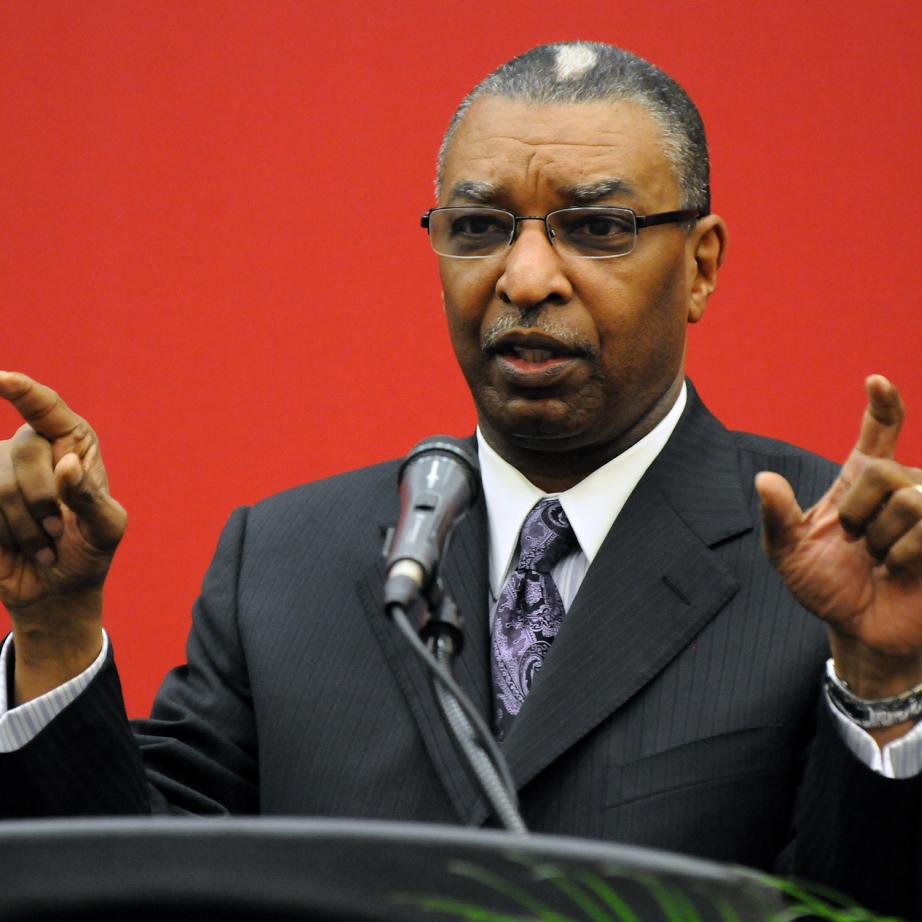Monday, Mar 5, 2012
Dr. Rev. DeForest B. Soaries, former New Jersey Secretary of State, gave the keynote address during the closing ceremony of Rider University’s Black History Month Celebration on February 28.
by Meaghan Haugh
On his first day working for the state, Dr. Rev. DeForest B. Soaries, former New Jersey Secretary of State, walked toward the police escort waiting outside his house, with a shoebox under his arm. When he got inside the car, the officer asked him the question he had been anticipating: “What’s in the shoebox?”
Though the shoebox in his grasp was empty, it held a lot of significance for Soaries. He told the officer how his grandmother would always carry a shoebox under her arm when she left their family home in Montclair, N.J., to drive to weddings and funerals in her hometown in Virginia. It was not until Soaries once had a moment alone in his grandmother’s bedroom that he discovered the contents in the shoebox on her dresser — a piece of fried chicken in between two white pieces of bread, boiled eggs and Kool-Aid in a peanut butter jar. When she returned to the room, Soaries asked her about what he had seen. What she told him shaped the rest of his life and explains the significance behind Black Student Union, Black History Month and the Washington, D.C. monument of Martin Luther King Jr.
“What she said to me was, ‘Buster, we live in Montclair, which is six hours away from Virginia by car. I can get hungry before I get there. I can’t stop the car to go to a diner. They don’t serve people like us,’” recalled Soaries, who was in fifth grade at the time. “But things won’t always be like that. Things are going to change.”
The personal anecdote was just one of the many stories that Soaries, senior pastor of the First Baptist Church of Lincoln Gardens in Somerset, N.J., shared during his keynote address at the closing ceremony of Rider’s Black History Month Celebration on February 28. He recalled how he would later find his grandmother crying in their kitchen after Martin Luther King Jr. was shot and killed. Still, Soaries held onto his grandmother’s belief that racial segregation and discrimination were going to change.
“When you know your history, you feel better about where you’ve been — who you are,” said Soaries, who served New Jersey’s 30th Secretary of State, the first African-American male to serve as a constitutional officer of the state. “If we don’t know where we were, we’ll miss some of the key dynamics, not of black people, but all people. It’s important to learn other people’s story.”
In another anecdote, Soaries shared how he served as a liaison between the press and the family at the funeral of Whitney Houston. Soaries, who had known Houston since she was a young girl, said he was shocked to learn how little the media knew about the Baptist church. He remembers speaking to two reporters who thought the funeral service would only last an hour and a half instead of several hours. The media had also called Houston’s funeral a “homecoming” instead of the actual term, “homegoing,” which is how Baptists describe when a loved one’s “stay down here is over and they are going to the other side.”
“That’s a telling example of why we have Black History Month,” Soaries said, championing the month-long heightening of awareness. “[People] in close proximity to the [Baptist community] can’t even describe where we are going.”
Soaries told the audience that it helps to know each other’s stories. By understanding each other, people can rise to the occasion to fix problems and make changes in society.
“Every faculty, student and administrator has a story. It helps by knowing each other’s story,” he said. “If we learn anything from Black History Month, someone has to make a decision to do something.”

